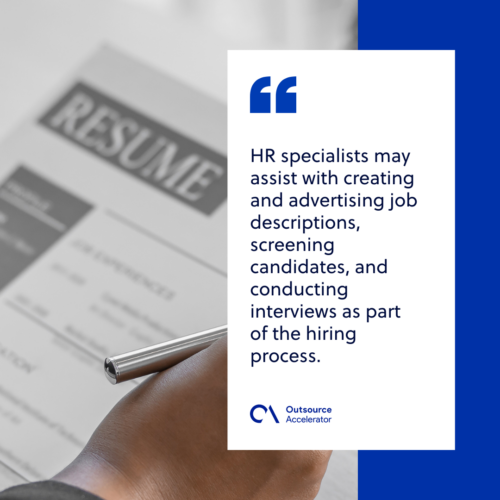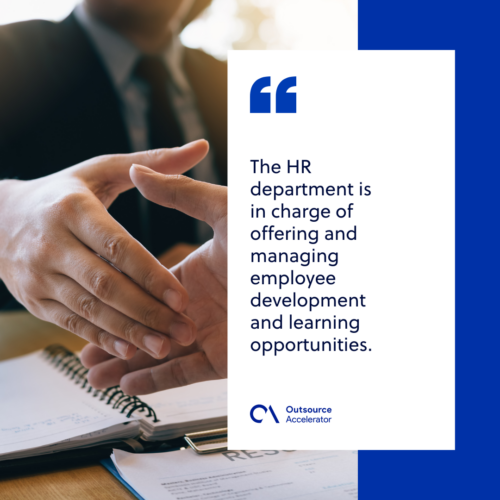HR responsibilities: Duties of the people managing the staff

Behind every business is a team of people who find, hire, and train employees to make the company work – the human resources (HR) department, or the lifeblood of companies. Having an HR is vital to every organization as they help provide structure and order.
They also assist companies in coping with the rapid changes in the business environment by managing their workforce.
Usually, this team is associated with the terms “hiring” and “firing,” but there are actually more HR responsibilities and duties that the people managing the staff do.
What is HR?
HR is the department responsible for managing employees and their life cycle, from attracting, training, firing, and retaining talent.
They are a group of individuals who have strong communication and people skills. HR professionals have credentials like a two-year degree in HR management or a Master of Science in Human Resources.
The people in HR are people who support others and love to see them succeed. In the company, HR helps deal with and meet the demands for a higher quality of employees.

What does an HR department aim to do?
Besides recruiting, hiring, onboarding, training, retaining, and firing employees, they also manage workforce performance and compensation and administer benefit programs.
An effective HR team is vital to ensure policy and legal compliance, no matter how big or small a company is.
Other than that, the HR department is also in charge of the following:
- Providing opportunities for career development
- Addressing issues and concerns in the workplace
- Developing policies for the company and ensuring its effectiveness in the company
When done correctly, HR can increase company efficiency by maintaining structure and organization while also supporting and assisting employees.
Companies seeking to have an HR department or individuals considering a career in human resources should know and understand HR responsibilities.
12 Common HR responsibilities
The HR department can help build a positive workplace by ensuring a good life cycle, or the interactions of an employee before, during, and after working for the company, as well as by providing good relationships between employees to reach personal and company goals.
There are seven HR responsibilities that ensure an effective life cycle.
Recruitment
The first HR responsibilities involve finding qualified people for open positions within the company.
HR specialists may assist with creating and advertising job descriptions, screening candidates, and conducting interviews as part of the hiring process. This duty is essential for an organization’s workforce development.
Additionally, they are in charge of monitoring that all recruiting and selection paperwork is completed from the beginning to the end of the hiring process.

Records management
The second HR responsibility is records management. HR teams are tasked to manage and organize private data like contracts, salaries, job duties, disciplinary actions, and performance evaluations.
They must always maintain confidentiality and professionalism when dealing with this information to ensure its security and accessibility.
Maintaining HR records helps employers analyze demographic data, seek and fill skill gaps in the hiring process, and stay in compliance with the standards and laws.
Employee relations management
The third HR responsibility is managing and organizing employee connections.
HR plays a significant role in managing a cohesive environment to improve relations between managers, supervisors, and employees. They also attend to plans and campaigns for union organizations and draft, negotiate, and interpret labor agreements and concerns.
Dealing with disputes arising from these issues through training or disciplinary measures is another task of employee relations management.
Payroll processing
Another HR responsibility involves processing payroll for their employees. They also look after employee benefit programs, such as retirement programs and health care coverage plans.
HR can administer the payroll in-house or, depending on the size of their business, work with external payroll service providers.
Compensation and benefits consolidation
Aside from payroll processing, HR teams also help designate the organization’s pay structure, like setting pay ranges for various roles and positions.
HR can also analyze the data to see if the employees are well compensated according to market standards.
Some compensation and benefits packages include health and dental insurance, life insurance, retirement plans, and other perks that increase companies’ ability to care for their employees.
An attractive compensation and benefits package can help entice and retain talent, and the HR department has to ensure that the company’s perks are sufficient.

Policy update and legal compliance
In this type of HR responsibility, the HR department should ensure its policies are reviewed, updated, and revised annually to see if they’re still essential to the company and its employees. If not, they should propose changes to ensure compliance.
Policies can also change as a result of an event. Therefore, HR should make the necessary revisions.
Besides updating policies, HR must also ensure compliance with labor regulations and laws as required, such as the Civil Rights Act and the Fair Labor Standards Act.
Failure to comply may lead to dangerous working conditions, customer complaints, and overall displeasure that can harm the organization and its employees. HR should take note of fair employment laws and ethical pay standards.
Imposing disciplinary measures
Another HR responsibility is conducting disciplinary measures and actions to ensure a safe working environment free from harassment, discrimination, and other illegal and harmful activities.
When an employee breaks the rules or acts up, HR conducts disciplinary measures and actions to protect themselves and other employees from threats.
Some examples of improper conduct include an incorrect performance of job responsibilities, misbehaving toward coworkers or clients, or improperly managing the workload and its schedule.
HR professionals follow a process when taking disciplinary action, like administering a verbal warning followed by a written notice prior to an employee’s suspension or termination.
When mismanaged, HR often receives the wrong impression and can even result in the termination of a valuable employee or a litigation case. Otherwise, disciplinary actions can help employees succeed and have a good working environment.
Fostering a safe and healthy workplace
The wellness of the employees is one of the critical factors for more productive and fulfilling work, so it is HR’s responsibility to have a crucial duty in ensuring workplace safety.
HR professionals will assist with this need by supervising and providing safety training, keeping workplace injury records, and reporting and addressing worker’s compensation demands that may emerge as required by the Occupational Safety and Health Act (OSHA).
Overall support for employees
Perhaps the ultimate HR responsibility is providing support for employees with these three practices:
Training, management, and support
One of the crucial roles of the HR department is providing training and development for its employees. Workers require regular and continuous training when:
- They are new to the organization, and for them to understand the company better
- Ensure employees are healthy and performing well
- Maintaining compliance with policy changes or legal regulations
- Managers and supervisors require leadership training to improve performance management, and employee relations
Supporting career growth
In relation to supporting and training managers, the next HR responsibility is to provide for and support employees’ career growth.
The HR department is in charge of offering and managing employee development and learning opportunities. This can help employees attain professional development through skill learning and improvement to improve their performance.
While some companies offer formal training programs and specialized courses, other organizations support employee education through tuition assistance or reimbursement.
Supporting employee development benefits both the employee and the organization by increasing overall worker satisfaction and loyalty.

Health and wellness
Since HR is the people operation of the organization, they must keep in mind that employees are humans that need assistance and protection for their health and wellness.
Providing medical assistance for employees’ concerns such as physical disabilities, mental illness, health issues, debt, pregnancies, adoption, and other life circumstances are also part of HR responsibilities.







 Independent
Independent




